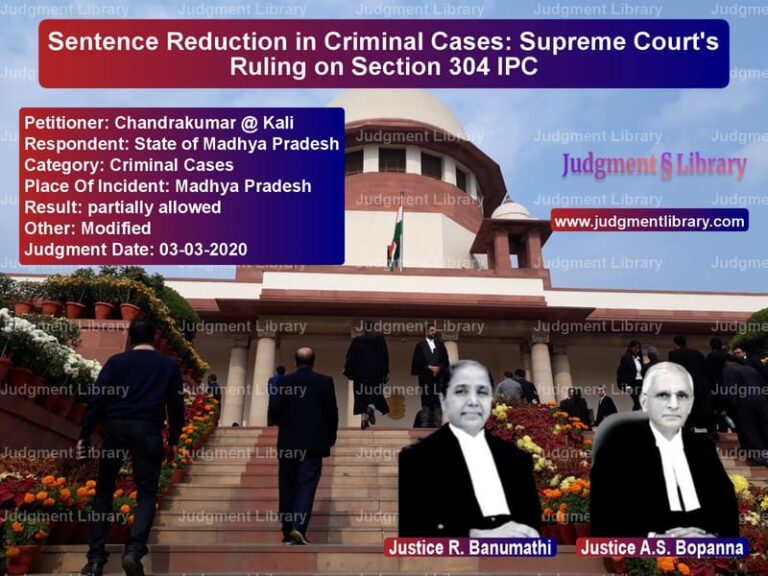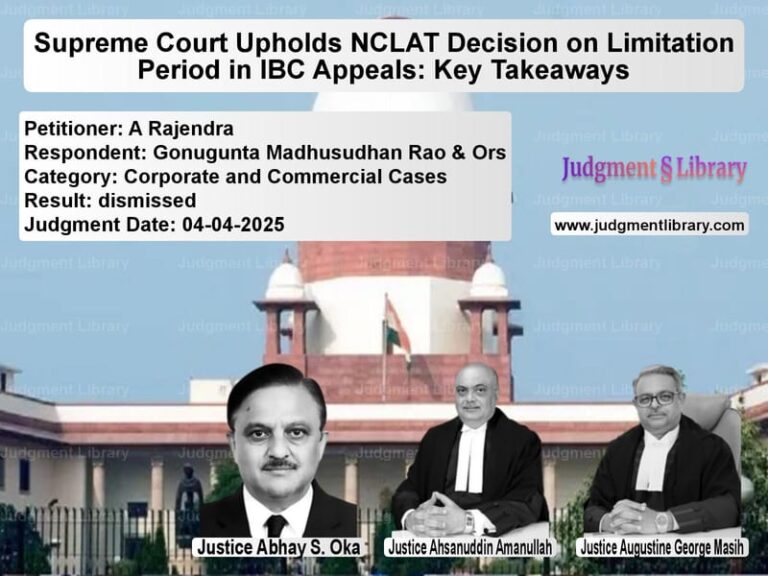Property Dispute Resolved: Arepu Anantha Lakshmi S. vs M/S. Shah Boomaji Lalchand
The case of Arepu Anantha Lakshmi S. vs M/S. Shah Boomaji Lalchand is a significant example of how legal disputes related to property ownership and tenancy can sometimes be resolved outside the judicial process. This case, which was initially presented before the Supreme Court, saw an unexpected conclusion when the appellant sought to withdraw the appeal due to an out-of-court resolution.
The main legal question before the Supreme Court was whether it should proceed with the appeal or dismiss it given that the premises in question had already been handed over to the appellant in 2014. The resolution of this dispute demonstrates the efficiency of judicial processes in recognizing settlements and preventing unnecessary litigation.
Background of the Case
The dispute arose between the appellant, Arepu Anantha Lakshmi S., represented by legal representatives, and the respondent, M/S. Shah Boomaji Lalchand. The case was initially brought before the Supreme Court as a civil appeal challenging a previous decision. However, during the pendency of the case, the parties involved reached an agreement, and the property in question was handed over to the appellant in 2014.
The appellant, upon realizing that the matter had been settled outside the court, sought permission from the Supreme Court to withdraw the appeal, asserting that there was no need for further adjudication. This request put the Supreme Court in a position where it had to determine the procedural course of action regarding the appeal.
Legal Issues Before the Court
- Whether the appeal should be allowed to be withdrawn after the matter had been resolved.
- Whether any pending interlocutory applications required additional adjudication.
- Whether the withdrawal of the appeal had any impact on the parties’ legal claims.
Arguments by the Petitioner (Arepu Anantha Lakshmi S.)
- The appellant’s counsel informed the Supreme Court that the premises in dispute had already been transferred to the appellant in 2014.
- The appellant sought permission to withdraw the appeal since the issue no longer required judicial intervention.
- The appellant further emphasized that any pending interlocutory applications should also be dismissed as part of the withdrawal request.
Arguments by the Respondent (M/S. Shah Boomaji Lalchand)
- The respondent did not contest the withdrawal request.
- The respondent agreed that the matter had been settled outside of court and saw no need for continued legal proceedings.
- No objections were raised regarding the dismissal of the appeal, affirming that all concerns had been addressed.
Supreme Court’s Observations
Upon hearing the arguments, the Supreme Court found no legal basis to continue the proceedings. It was satisfied with the submission that the property in question had already been handed over, rendering the appeal irrelevant. The Court noted:
“The learned counsel for the appellants, on instruction, seeks permission to withdraw this appeal, since the premises in question has already been handed over to the appellants in the year 2014.”
The Court further observed that since both parties were in agreement regarding the resolution of the dispute, there was no justification for keeping the matter pending in the legal system.
Final Judgment by the Supreme Court
The Supreme Court ruled as follows:
- The civil appeal was dismissed as withdrawn.
- All pending interlocutory applications were disposed of.
- There were no orders as to costs, ensuring that neither party bore additional legal expenses.
The Supreme Court concluded:
“The civil appeal is, accordingly, dismissed as withdrawn.”
Analysis of the Judgment
The Supreme Court’s handling of this case is an important reflection of judicial efficiency. Several key aspects of the ruling highlight its significance:
- Finality of Dispute Resolution: The Court recognized that once a dispute is resolved outside of court, there is no need for judicial intervention.
- Efficiency in Judicial Proceedings: Allowing withdrawal prevented unnecessary litigation and saved judicial time and resources.
- Consent-Based Resolution: Since both parties agreed to the withdrawal, the Court respected their mutual decision without further examination.
Impact of the Judgment
This case sets a precedent for similar situations where legal disputes are resolved amicably outside the court system. The Supreme Court’s acceptance of the withdrawal ensures that judicial resources are allocated to cases that genuinely require adjudication.
Conclusion
The ruling in Arepu Anantha Lakshmi S. vs M/S. Shah Boomaji Lalchand highlights the importance of respecting out-of-court settlements. By permitting the withdrawal of the appeal, the Supreme Court reinforced the principle that judicial processes should be utilized efficiently and only when necessary.
The case demonstrates that litigation should not be pursued for the sake of procedure but should serve a genuine purpose in resolving disputes. This judgment sets an important example for legal professionals and parties involved in property disputes, showing that settlements can sometimes be the most effective solution.
Don’t miss out on the full details! Download the complete judgment in PDF format below and gain valuable insights instantly!
Download Judgment: Arepu Anantha Lakshm vs MS. Shah Boomaji La Supreme Court of India Judgment Dated 21-02-2017.pdf
Direct Downlaod Judgment: Direct downlaod this Judgment
See all petitions in Property Disputes
See all petitions in Landlord-Tenant Disputes
See all petitions in Specific Performance
See all petitions in Judgment by Kurian Joseph
See all petitions in Judgment by R. Banumathi
See all petitions in dismissed
See all petitions in Declared Infructuous
See all petitions in supreme court of India judgments February 2017
See all petitions in 2017 judgments
See all posts in Civil Cases Category
See all allowed petitions in Civil Cases Category
See all Dismissed petitions in Civil Cases Category
See all partially allowed petitions in Civil Cases Category







